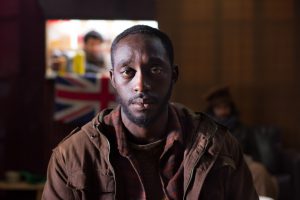On World Refugee Day, volunteer Helen Kingston writes about her decision to make refugees the focus of her new film, “The Flood” starring Lena Headey, out in cinemas tomorrow.
In October 2016 I applied to be a language support volunteer with the Refugee Council. I was paired with a Syrian refugee, a Mum with two kids, who had been placed in the town where I was born. Once a week, I went to her flat on a Tuesday morning. She would make me a strong coffee and we would sit together for an hour or two and work on her English. We were the same age, same height, with the same taste in biscuits. Her English was minimal and my Arabic was non-existent, but we managed.
Over the course of our time together, I saw how hard she was finding it to build a new life here. It made me consider how I would cope if the situation were reversed; if I was trying to learn Arabic and build a new life in a town in the Middle East. I did two years of French at school and can barely order a croissant, let alone fill in forms and pay bills in a language with a different alphabet. And the communication barrier is only the more obvious of the challenges.
The asylum system takes a huge toll on those who go through it, many of whom have already experienced trauma in their own country or on their journey to the UK. Along with the practical problems of money and housing, the Refugee Council’s research has highlighted the anxiety and loneliness that is often faced by people trying to rebuild their lives. It would be good for those who are critical of newcomers to acknowledge how hard it is to integrate into a new country. Hearing these men, women and children described in dehumanising terms by public figures made me angry, and made me want to speak out.

I wanted to write a film that looked at the immigration system in the UK and the perilous journeys often endured to get here. Film has the power to put the audience in someone else’s shoes; we see the world through the main character’s eyes and their triumphs and defeats become our triumphs and defeats. In the story we see the world from the point of view of a British immigration officer, and the Eritrean asylum seeker she interviews.
While I was researching the script, the Home Office updated its Country Information and Guidance on Eritrea, reducing the risk assessment for certain categories on return to Eritrea, including draft evaders and deserters. The rate for first instance grants of asylum for Eritrean asylum-seekers by the Home Office decreased from 77% in the first quarter of 2015 to 24% in the second quarter of the year. This influenced the story I chose to write.
Thankfully the policy was eventually reversed, thanks to the advocacy work of the Refugee Council and others. The Refugee Council, in partnership with UNHCR and the Scottish Refugee Council, conducted research into the experience of Eritrean asylum seekers in the UK. It noted that Eritreans experienced a high rate of successful appeals overturning initial Home Office refusals, but the process is slow and unsettling.
When I was about to start writing, I was told that a script about the refugee crisis would never get funded, that original dramas don’t get made and that films with female leads struggle to sell. Interesting, I thought. Then wrote it anyway.
My producer Luke Healy worked with casting director Manuel Puro and something extraordinary started to happen… internationally acclaimed talent started to come on board; it was a story they also wanted to tell. Very much for love not money, they poured their skills or support into the project, and the story made its way from words on a page to powerful images on screen: a place where stories can change hearts and minds. Our film “The Flood” stars Lena Headey, Ivanno Jeremiah, Mandip Gill and Iain Glen and is showing in cinemas and on Curzon home cinema from tomorrow.
We need more stories of refugees; there are over 70 million people who have been forced to flee their homes around the world. I hope that the film brings the subject back into people’s minds, along with World Refugee Week, and triggers conversations about what we can do. I hope our government listens to the calls of the UNHCR and the Refugee Council and supports a greater number of people through resettlement schemes, which support some of the world’s most vulnerable refugees.
Volunteering with the Refugee Council is immensely rewarding. If you are looking for a way to make a difference, I cannot recommend it more highly.
By Helen Kingston

